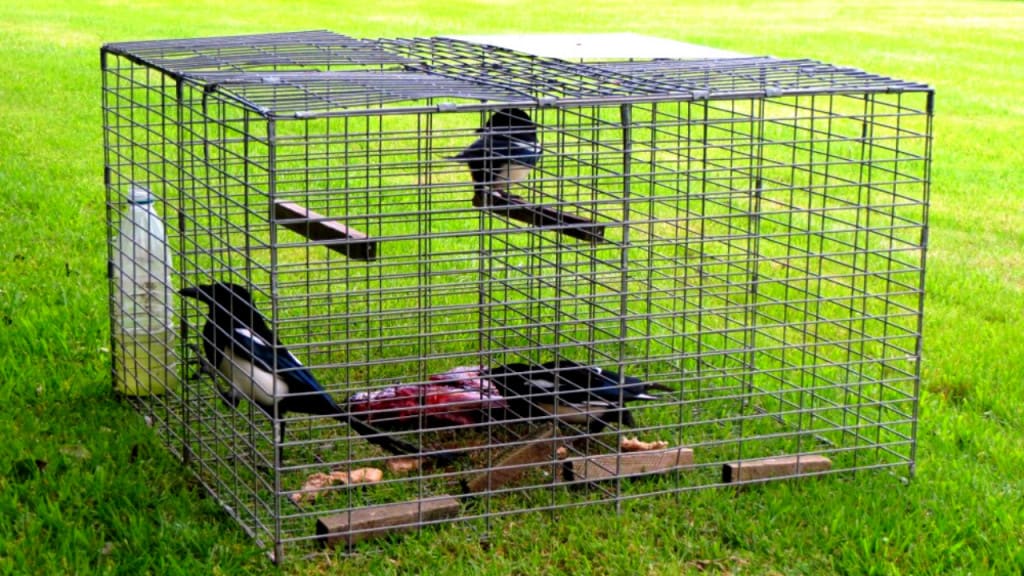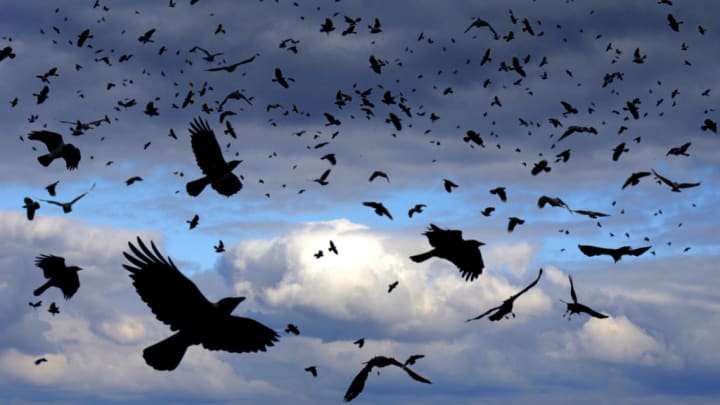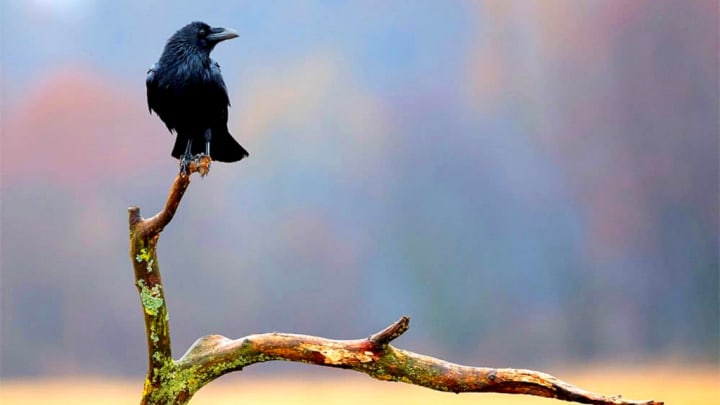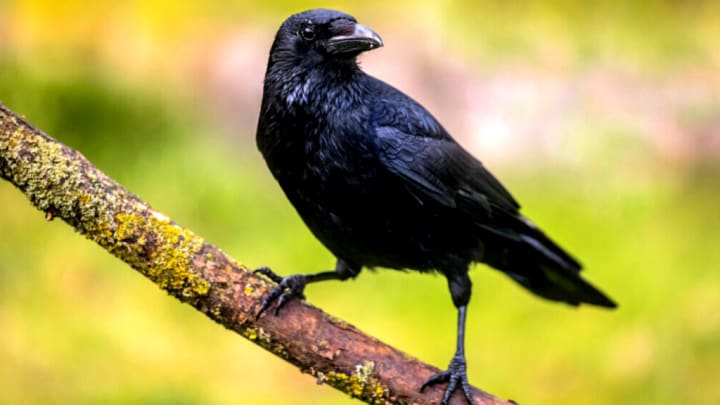How to Get Rid of Crows Using Homemade Crow Traps
Easy Ways To Get Rid of Crows

Everyone has spotted a crow at one point or the other. They are dark feathered birds and can be found everywhere in the world except Antarctica and certain regions of South America. They are, however, very different from other species of birds.
Crows are very intelligent and very stubborn. They are loud with very coarse voices. Their besting period is 35-40 days long. The younger crows are responsible for protecting the nest and taking care of and feeding the babies.
Crows prefer to roost in large numbers, with their population increasing rapidly from hundreds to thousands in on breeding times such as winter. They prefer places where they can get easy access to ample food supply, e.g., dumpsters. Crows like to live in open spaces with trees and plenty of food for the murder (group of crows).
Let’s take a look at why crows are a nuisance and some clever ways to get rid of them using homemade crow traps.
Why Do You Need to Get Rid of Crows?
- Crows will damage farm produce, especially when they are many. They destroy seedlings as soon as they shoot, which can ruin the crop entirely.
2. They will feed on other birds’ eggs and chicks.
3. Crows can cause damage to your property, such as cars and other household stuff left unattended.
4. They are known disease carriers, i.e., it’s known to carry the West Nile virus, which creates a high mortality rate in crows. If a mosquito bites an infected bird, it can transmit the virus to humans.
5. Crows droppings create a conducive environment in the soil for the growth of the histoplasmosis fungus. This fungus makes people working in such areas sick.
6. They are known to cause severe illnesses in humans, such as encephalitis, which causes inflammation in the nervous system. The symptoms include headache, drowsiness, and fever, which eventually puts the sick person in a coma.

Best Bait to Use to Trap Crows
Crows are omnivorous and opportunistic eaters in nature therefore;, they can feed on almost anything. They will eat leftover foodstuff, nuts, small insects, corn, and other birds. They are also predators and hunt frogs, mice, lizards, insects, rats, and other garden pests. Crows can also feed on dead carcasses if that’s what is available.
As discussed, crows are highly intelligent birds. While they might be incapable of passing on a score of food, they are still picky about what they can eat. You can test out what they like by leaving different types of food out.
When they like a specific type of food, they will swoop down fast to grab what you have left out. On the contrary, if you still find the food you have left out untouched after a few days, then you know that they hate that food and you should probably go with a different type.
When creating a homemade crow trap, you can use
- Fruits
- Eggs; preferably hard-boiled with the shell on
- Snails
- Popcorn
- Nuts
- Grubs
- Worms
- Peppers
- Raw grains
- Leftover raw or cooked meat
- Whole grain bread
- Whole grain pasta noodles
Foods to avoid include:
- Dried beans
- Tomato leaves
- Apple seeds
- Mushrooms
- Alcohol
- Salt
- Chocolate
- Products with caffeine
- Onions
- Avocados
The Habits of a Crow
It’s been discussed severally before that the crow processes a very intelligent outlook that other birds simply don’t have. This makes them very adaptable and can spot dangerous areas with ease. This can be discouraging to farmers or anyone looking to get rid of them using homemade crow traps.
If you want to catch crows, you have to outsmart them. Even then, you aren’t going to trap most of them. Should you make a mistake during this process, you might not get another chance. You can take advantage of their migration patterns and ability to sense danger because they might not return for a long time if they feel threatened.
Crows will actively look out for traps. If they figure out that you are using food to bait them, they make a noise to warn the others to avoid that area. This means you have to rethink your strategy and come up with a better plan.
However, you should know that crows are vindictive and remember faces. If you injure some of them using your homemade crow traps, they will hold a grudge and might harm you in the future, no matter how long it takes.

How to Make a Crow Trap
It’s ill-advised to try and catch a crow. It’s best to leave them alone or employ methods to repel them from your home or field. However, if you still want to catch crows, you better have authorities present to help you with a quick and baited homemade crow trap made of nets.
Crows usually don’t fall for cage traps. You also can’t expect to use other crows as bait for other crows. You have to be patient and more intelligent if you want to attract and capture a crow. However, it’s best to leave them alone.
Although traps don’t typically work, other natural, DIY ways prove effective in repelling crows. They include:
Installing an Ultrasonic Crow Repellent
Crows have very sensitive hearing and hate loud, high-pitched sounds. If you place such a device around your home, garden, yard, or farm, they will purposely avoid these areas.
All you have to do is buy a few of these devices and place them around the places you want to keep crows away from. They are pretty simple to install and will keep crows away from your home and crops.
Scarecrows
This is one of the oldest ways to keep crows at bay, and for a good reason, it works. Creating a scary scarecrow, rubbing the scent of its predators on it, and making loud noises is a sure way to repel crows from your farm. Scarecrows are simple to make with old clothes, masks, hay or grass clippings, poles or broomsticks, and a recorder to make loud noises.
Fake Versions of Predators
Crows are afraid of owls, bears, snakes, cougars, wolves, and other big predators. You can get yourself a fake version of any of the crow’s many known enemies and put them near their nests and preferred roosting spots. This might scare them off.
Repeated Loud Noise
If you know any annoying noise or loud heavy metal music, you can record some of these sounds and keep them on repeat when there is a murder of crows. This method won’t work if you try to get rid of them on a small piece of land because the noise will affect you and your neighbors. This homemade crow trap works best for large farms with scarecrows.
Clean Up Your Yard
The reason the crows are still hanging around is that they have an ample supply of food from your yard. Unkempt lawns are a breeding ground for insects and rodents, and an excellent food source for crows. Uncovered garbage, fallen fruits and nuts, and compost will also attract crows.
Have a regular maintenance schedule for your lawn and if you have a bird feeder, ensure that it’s crow proof. Get rid of all crow food and water sources, and they are bound to move on.
Use Fake Crow Distress Signals
You can also create a recording of other crow’s distress signals and caws. They hate these as much as they hate the high-pitched noise. You can use these recordings and place a few fake dead crows across your yard to make it seem like a dangerous place for crows.
This will alarm other crows and lead them to stay away from that area out of fear. This homemade crow trap is one made to outsmart the crow.
Attract Crow’s Natural Enemies To Your Yard
Although you might not want dangerous predators living around you so that they can repel crows, they are other more accessible choices to repel crows. You can create a conducive environment for other birds the crow hates, such as owls, eagles, and hawks.
For instance, if you live in an area native to purple martins, you can set up a purple martin birdhouse where they can get food and water. This will naturally keep crows away because these two birds are natural enemies.
Water Sprinklers
Crows hate being wet; therefore, they might not go near the wet areas if you can leave the sprinklers on longer. You can also install a motion-sensing water sprinkler which will turn on immediately when a crow lands in your yard.
Bird Netting
Crows will feed on anything, including your kitchen garden produce. Therefore, if you have a garden around your home, you must construct a protective barrier around your garden using stakes and nets. This won’t repel the crows, but they will not destroy your productivity. This is a simple homemade crow trap and won’t work for large fields of corn.
Bird Spikes
Bird spikes are a mechanical way to deter crows from roosting around your fence. They are made of polycarbonate and stainless steel, which makes them durable and weatherproof. They won’t harm the birds but deter them from sitting around there if you don’t want them to. This will force them to stay away from your backyard because they can’t land.
How Ethical or Legal Is It to Trap Crows?
Crows are protected under the protected songbird act. This means that harming, killing, and unauthorized capturing of any bird under this law is strictly prohibited. Anyone caught breaking this law will be fined and can get jail time in severe cases.
Before you make any homemade crow traps, you have to know and understand the local rules and regulations regarding the matter. You can talk to your local wildlife authorities so that they can help you with your crow problem.
Some people want to keep crows as pets which is considered highly unethical. The African crow can be a pet but requires a lot of care and attention. Their maintenance and medical needs can be pretty expensive in the long run.

Bottom Line
Crows aren’t just simple birds and require a lot to trap. Making simple homemade crow traps might not be a permanent solution. They may also be illegal if you make them without consulting the proper authorities.
If you need to get rid of crows that are maybe ruining your produce, you might have to call animal control, who is best equipped to deal with any pest species. They know how to humanely take care of crows within the confines of the law.
Catching crows on your own can also endanger your health. This is because crows are known disease carriers and infect you with something. They are also dangerous when they perceive you as a threat to their group.






Comments
There are no comments for this story
Be the first to respond and start the conversation.